Israeli Ex-Commander Says Better To Attack Iran 'Now Rather Than Later'

Former commander of Israel’s navy Eliezer Marom has said that Iran is on the threshold of obtaining nuclear weapons and it is better to attack “now than later.”

Former commander of Israel’s navy Eliezer Marom has said that Iran is on the threshold of obtaining nuclear weapons and it is better to attack “now than later.”
Speaking to i24News on Thursday, Marom was asked when the right time is to attack Iran’s nuclear installations.
"In my understanding, I think Israel has to attack, because the situation right now is that Iran is a threshold country - 100 percent," he replied.
The former vie-admiral said that although Iran is currently enriching uranium to 60 percent, it can quickly increase enrichment to above 90 percent, which is necessary for a nuclear bomb. He added, “the moment to jump from threshold to holding nuclear weapons will be very, very short… and therefore I think the time to attack… the clock is ticking, and we will have to do it sooner rather than later, sooner it means in the upcoming year."
Negotiation to re-establish limitations on Iran’s nuclear program are in limbo and Tehran has gone beyond the previous limit on enrichment that existed under the 2015 nuclear deal known as the JCPOA.
Israeli leaders have been warning that they will resort to a military attack to prevent Iran from obtaining a nuclear bomb, although experts believe that would be a difficult task if Israel tries to do it alone.
The United States conducted large-scale military drills with Israel this week, with some saying that the exercise was meant to be a message to the Islamic Republic.
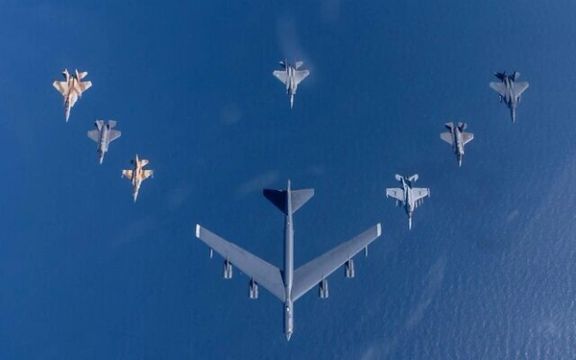
The United States and Israel concluded their largest-ever joint military drills, with thousands of troops, dozens of aircraft and naval vessels in and around Israel.
The drill, dubbed Juniper Oak 2023 was widely seen as a message to Iran, although US officials said the live-fire exercise did not include mockups of Iranian targets, but large American bombers did take part.
US and Israeli military ties have been expanding in recent months, as both Washington and Jerusalem pledge not to allow the Islamic Republic to acquire nuclear weapons. Negotiations to revive the Iran nuclear deal came to a deadlock last September, as Tehran continues to enrich uranium and is said to have enough fissile material for 3-4 bombs.
IDF chief Herzi Halevi said “Israel and the US share the same values, and the IDF and CENTCOM share the same outlook on the threats facing this region,” adding that the drill “raised our level of planning and implementation of combined operations.”
“Israel is capable of defending itself, but it’s always good to have our greatest partner beside us to learn from one another. This operational partnership strengthens our ability to deal with a wide range of security challenges in the region,” Halevi said in remarks published by the IDF.
“Today the partnership between CENTCOM and the IDF is stronger and continues to grow,” said General Michael Kurilla, the commander of CENTCOM. “Our partnership is a key pillar of our commitment to expanding regional security cooperation,” he added.
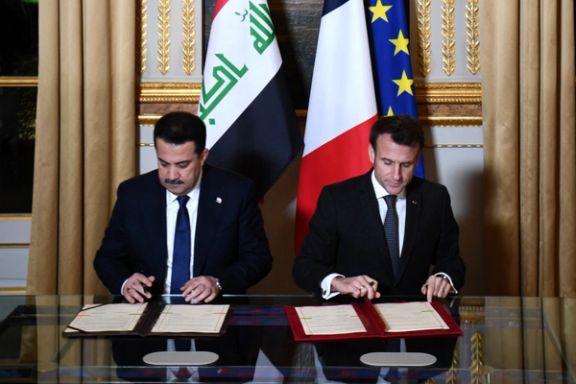
About a month after France called for curbing the Islamic Republic’s influence in Iraq, Paris and Baghdad have signed a strategic cooperation agreement.
French President Emmanuel Macron held a meeting with Iraq Prime Minister Mohammed Shia al-Sudani on Thursday in which they inked a set of strategic agreements meant to boost Baghdad's economic cooperation with Paris, especially in the energy and public transportation sectors.
"I just signed the Strategic Partnership Agreement with my friend Mr. Macron, which sets a roadmap for expanding the horizons of cooperation between our two countries in various fields," read a tweet from the Iraqi PM following his reception by the French president.
In a statement issued in the early hours of Friday, the Elysee Palace said France and Iraq also signed a treaty seeking to strengthen bilateral relations in anti-corruption, security, renewable energy and culture.
"(Macron and Shia al-Sudani) have reaffirmed their commitment to complete big network infrastructure projects based on French knowhow (...) In that respect they have pledged to grant Iraq the expertise of French companies," read the statement, adding that "In terms of alternative energies, they showed their commitment to the implementation of TotalEnergies's multiple-energies project (...) based on solar energy and investments in gas."
Macron in December attended the second gathering of the Baghdad Conference for Cooperation and Partnership in Jordan, which aimed at providing support for Iraq’s stability and security. The summit, which was held on the shores of the Dead Sea, brought together twelve countries of the region, including the archenemies Saudi Arabia and the Islamic Republic. Tehran's policies of intervening in other countries affairs was condemned at the “Baghdad II” summit.
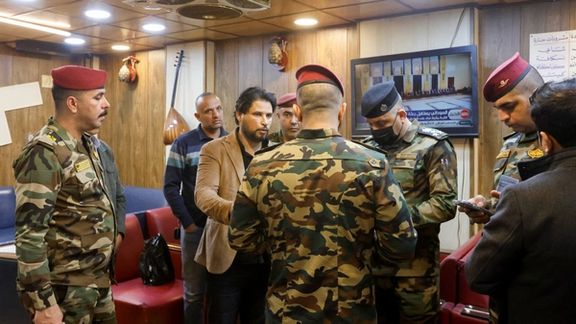
Following demonstrations in Iraq over the recent slide of the Iraqi dinar against the dollar, a delegation of Iraqi officials will travel to Washington to resolve issues related to US banking restrictions.
As hundreds of people demonstrated near the central bank headquarters in Baghdad on Wednesday to protest the devaluation of the Iraqi dinar against the dollar, which has triggered a rise in prices of imported consumer goods, an informed source told Iran International that representatives from the Iraqi government are scheduled to go to US next month to investigate the smuggling of dollars from Iraq to Iran.
People from different Iraqi regions waved Iraqi flags or carried banners demanding government intervention to stop the dinar's decline to around 1,620 to the greenback from 1,470 in November. “Stop the neighbors stealing our dollars,” one banner read, alluding to Iran. The protesters demand that the government must intervene to stop the decline of dinar value because people are suffering from high prices in local markets.
According to Iran International’s source, who asked not to be named, it is not clear whether Iraqi Prime Minister Mohammed Shia' Al Sudani will head the delegation or not. The visit could take place in early February.
The dinar went into a tailspin against the dollar after the New York Federal Reserve imposed tighter controls on international dollar transactions by commercial Iraqi banks in November to halt the illegal siphoning of dollars to neighboring Iran, which is under tough US sanctions.

The move blocked more than 80 percent of Iraqi bank transfers. Under the curbs that took effect this month, Iraqi banks must use an online platform to reveal their transaction details. But most private banks have not registered on the platform and resorted to informal black markets in Baghdad to buy dollars.
This has created dollar shortages as demand has outstripped supply and accelerated the dinar's descent against the greenback. The Wall Street Journal recently reported that the intensification of pressure on the Islamic Republic has caused the value of Iraq's currency to drop.
Sudani replaced the central bank governor on Monday as he had not taken effective steps to tackle the consequences of the new Fed regulations and their impact on the dinar.
Late in December, an informed source in Baghdad told Iran International that Washington has received reports on Iraq conducting trade with Iran using US dollars despite US sanctions. This source added that the names and bank account numbers that have secretly interacted with Iran have not yet been revealed, but the Biden administration has found out that a large amount of US dollars has been transferred from Iraq to some countries, including Iran.
The Islamic Republic needs Dollars to stabilize its deteriorating economy hit hard by US sanctions imposed since 2018 after then-US President Donald Trump ditched Tehran's nuclear deal with six world powers. Iran's troubled currency has lost more than 30% of its value since nationwide protests following the death in police custody of a young 22-year-old Iranian woman, Mahsa Amini, on September 16, 2022 that have further isolated the country.
For years, the clerical establishment has used front companies from Iraq to Turkey to obtain the dollars it needs for international transactions and funding its proxy militia forces across the Middle East.
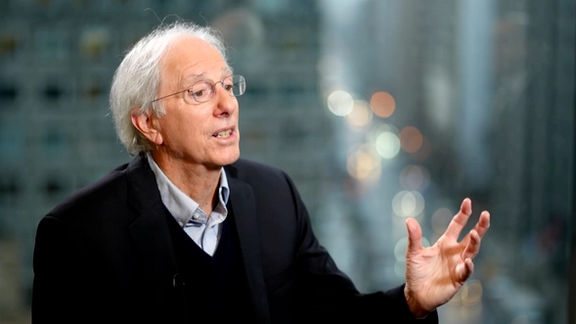
An American foreign policy aide in successive US administrations told Iran International that the only way the US would remove sanctions on Tehran is a whole new deal.
In a face-to-face with our correspondent Arash Alaei, Dennis Ross said that the Islamic Republic has lost its chance to revive the 2015 nuclear deal with making extra demands, noting that now the only move that may kickstart the talks is a halt in Tehran’s uranium enrichment to over five-percent purity.
Iran should not be enriching to 60 percent or even 20 percent, he said, adding that the Islamic Republic is crossing thresholds that may push the Biden administration to a path that it would not like to pursue, he said. The Biden administration might say “what was on the table is no longer on the table. You had a chance to do the JCPOA and you chose to try to get more,” he added.
He said that the administration sought a longer and stronger deal since the beginning, speculating that if they want to agree on a deal, it will not be going back to the JCPOA. “The deal has to apply for much longer; it has to be stronger, then there would be readiness to talk about a deal,” he said, foreseeing that Washington would ask Tehran to give up more if it wants to potentially get more.
Ross was the director of policy planning in the State Department under President George H. W. Bush, the special Middle East coordinator under President Bill Clinton, and a special adviser for the Persian Gulf and Southwest Asia -- which includes Iran -- to the former Secretary of State Hillary Clinton.
Referring to the recent round of Western sanctions on the Islamic Republic officials, Ross said that this is a message to Tehran that “we are collectively hardening our approach because of the behavior of the Iranian regime.” He added that slapping the Revolutionary Guard with the terrorism label by the Europeans has never been really considered. Ross mentioned the coordination among the US and its allies to close the loopholes so that Iran cannot sell its oil as another measure that showed the world is standing against the regime.
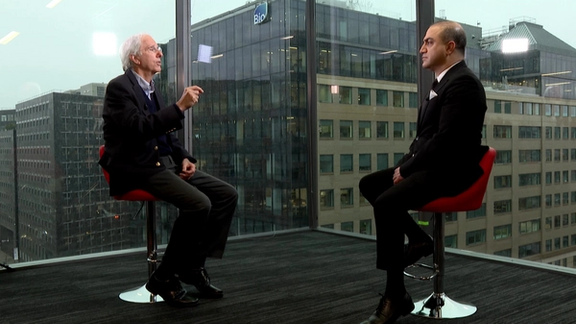
All of these indicate that “the Islamic Regime needs to understand that life is going to become more difficult for them if they stay in the path they are on,” he underlined.
The West on Monday stepped up pressure on Iran over its crackdown on protests and arms supply for the Russian invasion of Ukraine as the US, the European Union and United Kingdom imposed fresh sanctions on Tehran. However, the EU stopped short of designating the IRGC a terrorist outfit, as the European Parliament had voted last week to urge the block to do.
He said that the regime is enriching uranium to the levels that have no civilian use, elaborating that Iran “continues to move ahead with its nuclear program. It has 16 cascades of advanced centrifuges – the IR6s -- that are enriching to 60 percent, for which there is no justifiable civilian purpose.” “When you enrich uranium, you can rationalize it saying we’re going to use it to generate electrical power. When you enrich to 60 percent, you have one purpose in mind.”
The Islamic Republic “has probably four bombs worth of enriched material to 60 percent,” adding that “60 percent is not weapons grade but it’s close to weapons grade,” Ross said. It means it takes very little time for them to turn the fissile material into bombs, he added. “You still have to take that fissile material and take it to weapons. There is a big difference between enrichment, which is taking place in large facilities and the process of weaponization, which can be taking place in facilities that we wouldn’t be aware of,” Ross warned.
The Middle East expert believes that Iranians are playing with fire. If the Biden administration says, “we will prevent you from having a nuclear weapon, they are pushing the Biden administration towards what will be a military action, even if that's not what the Biden administration would prefer to do.”
About the joint military war games by the US and Israel -- their biggest so far with thousands of forces, a dozen ships, and 142 aircraft, including nuclear-capable bombers – he said the nature of this maneuver is unprecedented as they have integrated every domain. “They are doing it in space, they are doing it in air with aircraft, they are doing it in cyber, they are doing it on the ground, and they are doing it with naval. All these separate domains, all these separate forces are being integrated between the two and they include suppression of air defenses; it includes B52 bombers,” he added. The scope of such war games “involves a kind of action the US and Israel would be taking if there was a decision to carry out the use of force against Iran’s nuclear program.” He described the drills as a rehearsal or preparation for such an action against Iran, he highlighted.
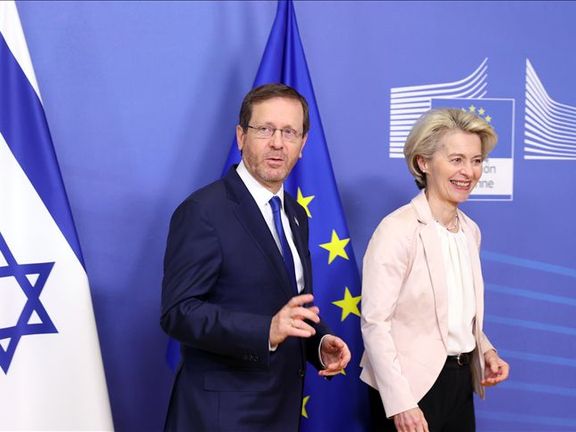
Israeli President Isaac Herzog has called on Europe to take a firm stance against Iran as it poses a challenge to Israel, the region, Europe, and the world.
Herzog made the comments Wednesday in a meeting with European Commission President Ursula von der Leyen in Brussels.
“Iran is fighting Ukrainian citizens by supplying drones and lethal weapons, endangering the world by rushing toward nuclear capabilities, killing and torturing its own citizens,’’ he stated.
Earlier this week, the European Parliament approved a resolution with absolute majority to designate Iran’s Islamic Revolutionary Guard Corps (IRGC) as a terrorist organization. However, the EU refused to do so, with its Foreign Policy Chief Josep Borrell saying the move needs a ruling by a European court.
The West on Monday stepped up pressure on Iran over its crackdown on protests and arms supply for the Russian invasion of Ukraine. The US, the European Union and United Kingdom imposed fresh sanctions on Tehran.
Members of the European Parliament as well as Iranians have called on European politicians to declare the IRGC as a terror group, as it is responsible for leading most of the security forces who killed, maimed and arrested protesters.
The issue of Europe listing the IRGC emerged in recent weeks as the Iranian regime has killed more than 500 people during popular protests that started in September, after the death of Mahsa Amini in hijab police custody.